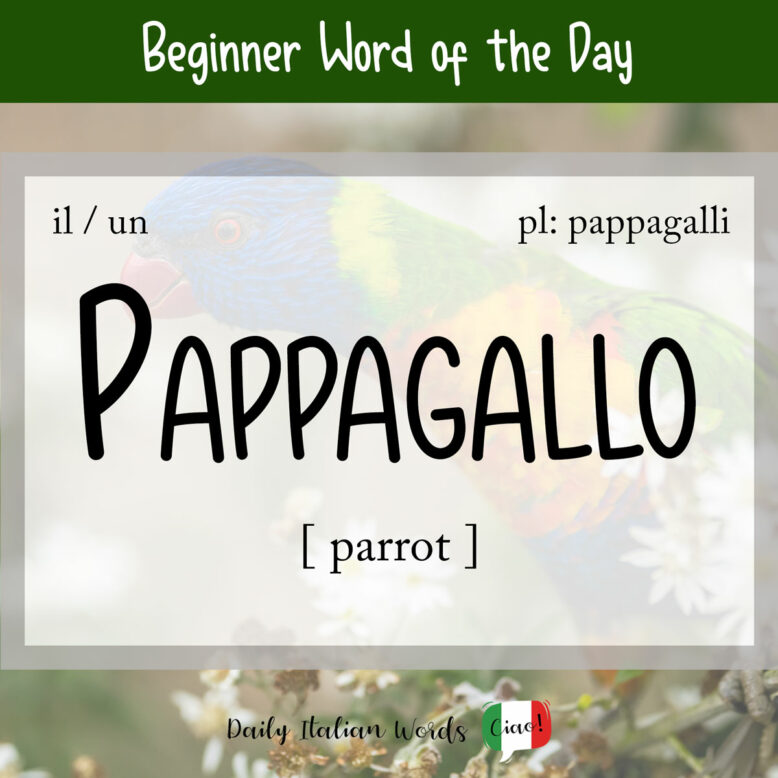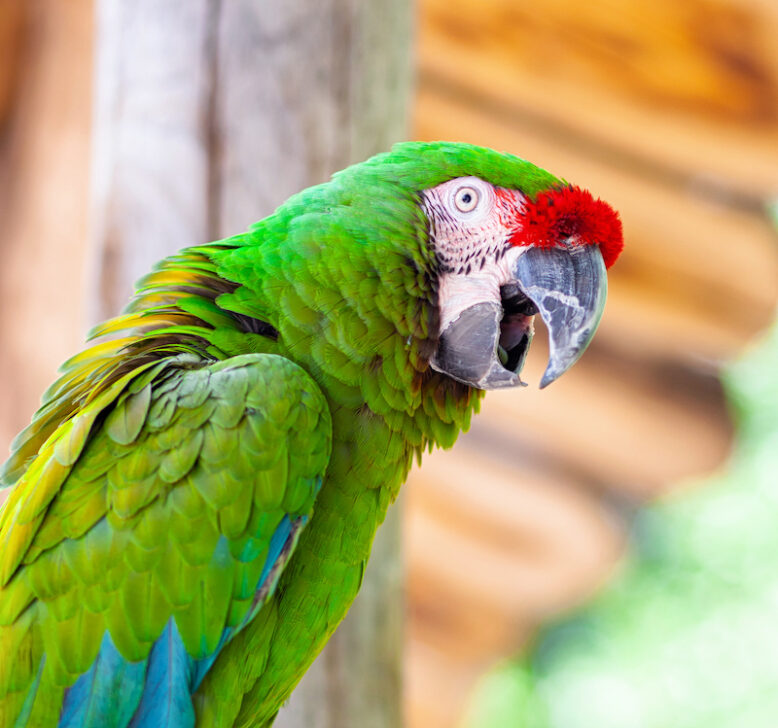The word for a parrot in Italian is pappagallo. It entered the Italian language from the Arabic babaġā via the Greek papagâs.

Pappagallo is a masculine noun. The plural is pappagalli.
un pappagallo
il pappagallo
dei pappagalli
i pappagalli
Ieri ho visitato uno zoo e ho visto tanti pappagalli colorati.
Yesterday I visited a zoo and saw a lot of colourful parrots.
Parrots have the tendency to mimic human speech, which is where the expressions ripetere a pappagallo and fare il pappagallo – both of which mean to parrot or to repeat – come from. (Ripetere means to repeat, whereas fare means to do.)
Smettila di fare il pappagallo! Non hai nulla di meglio da fare?
Stop repeating everything! Don’t you have anything better to do?
Another related verb is spappagallare, which is the combination of the intensive s- prefix and pappagallo. It means to chatter non-stop.
The diminutive pappagallino, on the other hand, is one of two names given to the budgie (or parakeet), the other being parrocchetto.
Two other terms you may encounter are pappagallesco, which means parrot-like, and pappagallismo, which can translate as either parroting or catcalling depending on the context.

Il Pappagallo – Sergio Endrigo
My son and I are big fans of Italian singer-songwriter Sergio Endrigo who, in addition to writing for an adult audience, also released quite a few popular songs for children. Il Pappagallo appears on the album L’Arca (the Ark) alongside a number of other tunes about various animals.
Note that in the first verse, Endrigo sings Ma che bello pappagallo, but Italians would actually say Ma che bel pappagallo. I suspect the author used bello instead of bel to match the rhythm of the song.
Ma che bello pappagallo
Tutto verde l’occhio giallo
Cosa fai che cosa vuoi
Parli parli parli parli
Parlo parlo parlo parlo
Ma che bello pappagallo
Tutto verde l’occhio giallo
Ma che bello pappagallo
Parlo parlo parlo sì
Tutto verde l’occhio giallo
Ma che bello pappagallo
Ma che triste pappagallo
Tutto verde l’occhio giallo
Se sei triste cosa fai
Canti canti come un gallo
Canto canto canto canto
Sono un triste pappagallo
Sempre solo come un gallo
Sono un triste pappagallo
Canto canto canto sì
Sempre solo come un gallo
Sono un triste pappagallo
Pappagallo poverino
Tu sei vecchio e sei bambino
Chi lo sa quanti anni hai
Un bambino di cent’anni
Piango e rido piango e rido
Pappagallo poverino
Ho cent’anni e son bambino
Pappagallo poverino
Ho cent’anni e son bambino
Pappagallo poverino
Pappagallo brasiliano
Il Brasile ormai è lontano
Tu che libero sei nato
Te lo sei dimenticato
Tu che libero sei nato
Te lo sei dimenticato
Parli forte e pensi piano
Pappagallo brasiliano
Te lo sei dimenticato
Parli forte e pensi piano
Pappagallo brasiliano
What a beautiful parrot
All green with a yellow eye
What are you doing, what do you want
You talk, talk, talk, talk
I talk, talk, talk, talk
What a beautiful parrot
All green with a yellow eye
What a beautiful parrot
I talk, talk, talk, yes
All green with a yellow eye
What a beautiful parrot
What a sad parrot
All green with a yellow eye
If you’re sad what are you going to do
You sing, sing, like a rooster
I sing, sing, sing, sing
I’m a sad parrot
Always alone like a rooster
I’m a sad parrot
I sing, sing, sing, yes
Always alone like a rooster
I’m a sad parrot
Poor little parrot
You are old and a child
Who knows how old you are
A child who is 100 years old
I cry and laugh, cry and laugh
Poor little parrot
I’m 100 years old and a child
Poor little parrot
I’m 100 years old and a child
Poor little parrot
Brazilian parrot
Brazil is now far away
You were born free
You’ve forgotten this
You were born free
You’ve forgotten this
You speak loudly but think quietly
Brazilian parrot
You’ve forgotten
You speak loudly but think quietly
Brazilian parrot
Heather Broster is a graduate with honours in linguistics from the University of Western Ontario. She is an aspiring polyglot, proficient in English and Italian, as well as Japanese, Welsh, and French to varying degrees of fluency. Originally from Toronto, Heather has resided in various countries, notably Italy for a period of six years. Her primary focus lies in the fields of language acquisition, education, and bilingual instruction.


